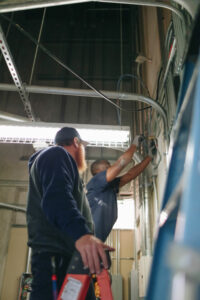Yes, PVC conduit can indeed be used in commercial buildings. At Right Touch Electrical, we often receive inquiries regarding the suitability of PVC conduit for such applications. Let’s delve into this topic further to provide clarity on using PVC conduit in commercial electrical installations.
for such applications. Let’s delve into this topic further to provide clarity on using PVC conduit in commercial electrical installations.
Understanding PVC Conduit In Commercial Buildings
PVC (polyvinyl chloride) conduit is a type of electrical conduit commonly used to protect and route electrical wiring in various applications. It is made of durable PVC material, which offers excellent resistance to corrosion, moisture, and chemical exposure, making it suitable for both indoor and outdoor installations.
Benefits of PVC Conduit
PVC conduit offers several advantages for electrical installations in commercial buildings:
- Durability: PVC conduit is highly durable and resistant to corrosion, providing long-term protection for electrical wiring in commercial environments.
- Flexibility: PVC conduit is flexible and easy to work with, allowing for versatile installation in a wide range of applications and building structures.
- Cost-Effectiveness: PVC conduit is cost-effective compared to other types of electrical conduit, making it an economical choice for commercial projects.
- Chemical Resistance: PVC conduit is resistant to chemicals, oils, and other substances commonly found in commercial environments, ensuring reliable performance in harsh conditions.
- Ease of Installation: PVC conduit is lightweight and easy to install, reducing labor costs and installation time for commercial electrical projects.
Considerations for Commercial Use of PVC Conduit
While PVC conduit offers many benefits, there are some considerations to keep in mind when using it in commercial buildings:
- Temperature Limitations: PVC conduit may have temperature limitations, especially in extreme heat or cold conditions. It is essential to ensure that the conduit material is suitable for the intended environment and application.
- Fire Rating: PVC conduit may not have the same fire resistance rating as other types of conduit materials. It is crucial to comply with building codes and regulations regarding fire safety in commercial buildings.
- Mechanical Strength: PVC conduit may have lower mechanical strength compared to metal conduit options. It is essential to properly support and secure PVC conduit to prevent damage and ensure structural integrity.
- UV Exposure: PVC conduit may degrade when exposed to prolonged sunlight or UV radiation, especially in outdoor installations. UV-resistant PVC conduit or proper UV protection measures may be necessary for outdoor applications.
Code Compliance and Regulations
When considering the use of PVC conduit in commercial buildings, it is essential to adhere to relevant building codes, regulations, and industry standards. Building codes may specify requirements for conduit material, installation methods, fire resistance, and other factors to ensure safety and compliance with electrical codes.
Why Choose Us For Commercial Low Voltage Electrical in Houston?
At Right Touch Electrical, we understand the unique challenges and requirements of commercial electrical installations. Our team of licensed electricians has the expertise and experience to assess your needs, recommend suitable conduit options, and ensure compliance with building codes and regulations.
Contact Us Today
If you have questions about using PVC conduit in your commercial building or need assistance with electrical installations, don’t hesitate to contact Right Touch Electrical. Schedule a consultation with us today, and let us provide you with reliable solutions tailored to your specific needs. Experience the Right Touch Electrical difference for yourself!
FAQs about Using PVC Conduit in Commercial Buildings In Houston
Is PVC conduit suitable for outdoor installations in commercial buildings?
A: PVC conduit can be used for outdoor installations in commercial buildings, but it may require UV-resistant properties or additional UV protection measures to prevent degradation from sunlight exposure over time.
Are there any restrictions on the diameter or size of PVC conduit used in commercial electrical installations?
A: Building codes and regulations may specify requirements for conduit diameter and size based on the application and electrical load. It’s essential to consult with a licensed electrician to ensure compliance with relevant codes and standards.
Can PVC conduit be used for high-temperature applications in commercial buildings?
A: PVC conduit may have temperature limitations, especially in high-temperature environments. It’s crucial to verify that the conduit material is suitable for the intended application and temperature range to ensure safe and reliable performance.
Does PVC conduit require special fittings or connectors for installation in commercial buildings?
A: PVC conduit typically uses compatible fittings and connectors designed specifically for PVC piping systems. These fittings ensure proper sealing and connection integrity for electrical wiring in commercial installations.
What are the advantages of PVC conduit compared to other types of conduit materials for commercial applications?
A: PVC conduit offers benefits such as durability, flexibility, cost-effectiveness, chemical resistance, and ease of installation. These advantages make PVC conduit a popular choice for various electrical installations in commercial buildings.
Can PVC conduit be used in environments with exposure to chemicals or corrosive substances?
A: PVC conduit is resistant to chemicals, oils, and other corrosive substances commonly found in commercial environments. However, it’s essential to verify that the conduit material is compatible with specific chemicals and substances present in the environment to ensure long-term performance.
Is PVC conduit compatible with all types of electrical wiring used in commercial buildings?
A: PVC conduit is compatible with most types of electrical wiring commonly used in commercial buildings, including copper and aluminum conductors. However, it’s essential to ensure that the conduit size and type meet the requirements of the electrical system and application.
What are the considerations for installing PVC conduit in areas with high mechanical stress or vibration in commercial buildings?
A: PVC conduit may have lower mechanical strength compared to metal conduit options, making it susceptible to damage in areas with high mechanical stress or vibration. Proper support and securing of the conduit are essential to prevent damage and ensure structural integrity in such environments.
Are there any special maintenance requirements for PVC conduit installed in commercial buildings?
A: PVC conduit typically requires minimal maintenance in commercial installations. Periodic inspections may be necessary to check for signs of damage, degradation, or environmental exposure that could affect conduit performance and safety.
Can PVC conduit be used for underground installations in commercial buildings?
A: PVC conduit is suitable for underground installations in commercial buildings, but it may require additional measures such as proper burial depth, backfill material, and protection against moisture to ensure long-term reliability and performance.
